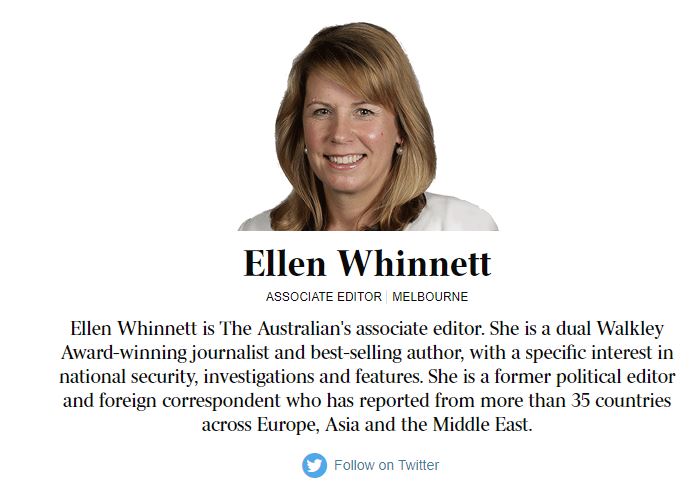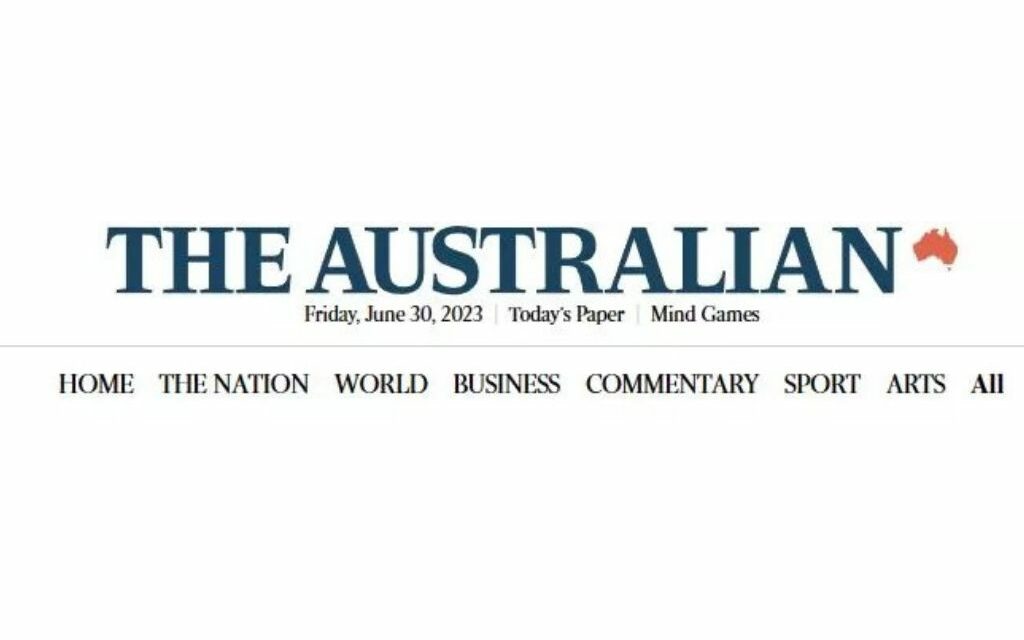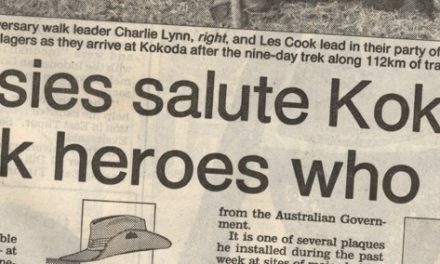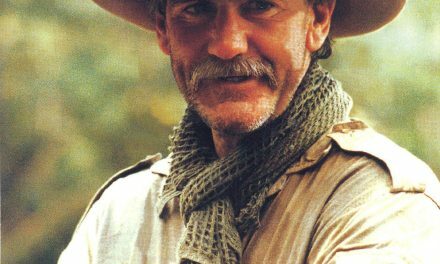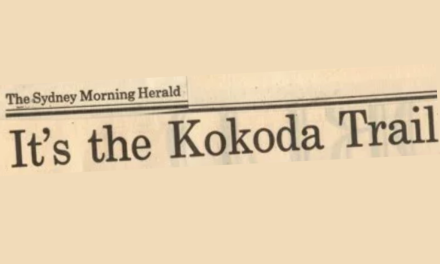EXCLUSIVE By ELLEN WHINNETT
ASSOCIATE EDITOR
@ellenwhinnett
A new battle erupts for control of the Kokoda Track | The Australian
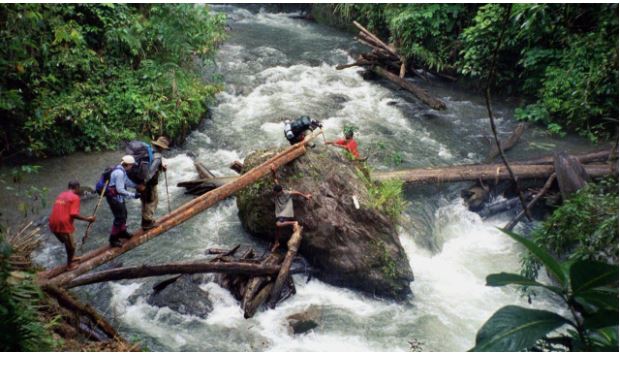
Eighty-one years after the Battle of Kokoda, a new fight has erupted on one of Australia’s most sacred battlegrounds.
Rival groups are jostling for control of the famed Kokoda Track amid deep concern about the governance and maintenance of the jungle trail where 600 Australian soldiers died holding Japanese forces out of Port Moresby in one of our most important victories of World War II.
The 96km track has been blockaded by locals from the village of Kovelo who are demanding hundreds of dollars in “fees’’ from tour companies – busy with Australian school holiday trekkers – to be allowed to pass.
On one side of the dispute is Australia’s highest-profile Kokoda trek operator, Charlie Lynn, and a rebel organisation which is challenging the Papua New Guinea government’s Kokoda Track Authority for the right to manage the trail and collect and disburse permit fees. The organisation has vowed to “take back the Kokoda Trail’’.
On the other side are the PNG and Australian governments, and the Kokoda Tour Operators Association, which represents eight of the largest Australian trekking companies and is headed by former Commonwealth boxing champion Mick O’Malley.
This group supports the existing Kokoda Track Authority, although it has expressed concern about its governance and transparency.
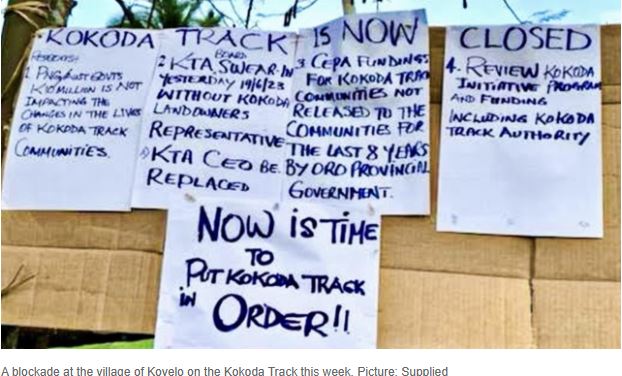
At stake is the distribution of millions of dollars paid by trekking companies for permits to guide about 3000 Australian tourists every year across the rugged track.
The KTA currently collects about $150 per trekker in permit fees, ostensibly to pay the traditional landholders and improve conditions at the campsites and villages along the way. But it has failed to produce financial reports and there is no clarity about where the money has gone.
The blow-up
The dispute blew up in April when Mr Lynn’s company, Adventure Kokoda, embarked on four treks around Anzac Day without applying for permits, with Mr Lynn declaring the track was so poorly maintained he would pay the campsite owners directly.
In a confrontation at Owers Corner involving police and local KTA rangers, Mr Lynn was supported by members of the newly established Kokoda Trail Tourism Development Association, which had declared it was taking over management of the track.
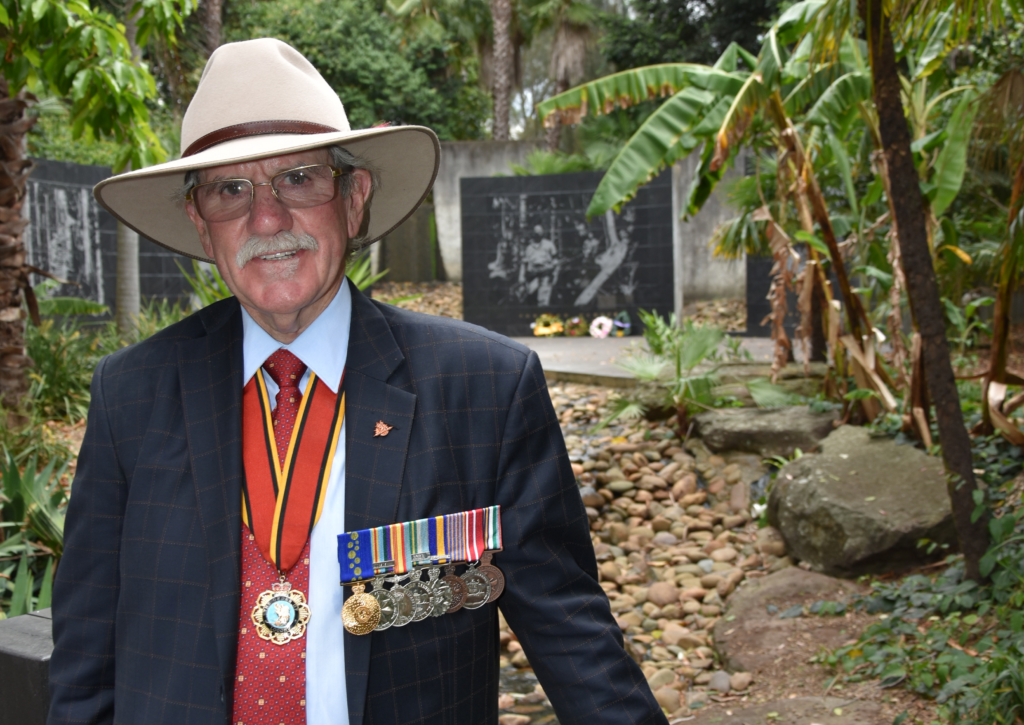
Charlie Lynn at the Kokoda Track Memorial Walkway, Concord. Picture: Bob Barker
“This is about taking back Kokoda Trail,’’ the president of the KTTDA, Kila Sibolo, wrote to local MP, Oro province governor Gary Juffa, on March 25.
Mr Sibolo was at Owers Corner supporting Mr Lynn on April 14, along with Andy Abel, who heads the surfing tourism body and the Tourism Technical Working Group in PNG, and has joined Mr Sibolo in establishing the KTTDA.
In a press release issued to local media, Mr Sibolo listed a string of conditions which he said the new organisation would be enforcing. They included trekking fees being paid to the KTTDA, that porters would carry reduced weights and work maximum eight-hour days, and that a landholder company would be established and funds dispersed to benefit villagers and landholders along the track.
The blow-up has alarmed PNG and Australian government officials, and tour operators fear it could deter trekkers from signing up for the walk, which takes about nine days and costs upwards of $4000 per person.
Passionate returned serviceman Paul Miller trained for months ahead of a gruelling Kokoda trek for charity – but…
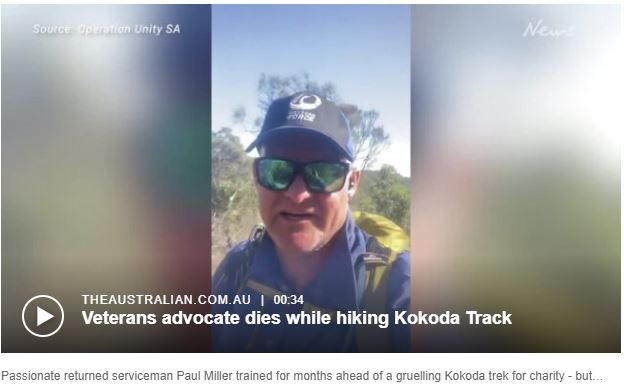
About 2.5 porters are needed to sustain each trekker across the track. It is the major source of employment and income sustaining the string of villages along the track. It is widely accepted the track needs maintenance, including improved toilets, bridges and better accommodation for the porters who sleep in bark huts.
The KTA’s website is down, it has not received its promised funding injection from the PNG government and its acting chief executive, Julius Wargirai, confirmed it had not issued a financial report since 2016.
The KTA is propped up by millions of dollars from Australian taxpayers paid through the Kokoda Initiative, which provides facilities such as water supply, solar power and health clinics.
The Kokoda Tour Operators Association is also seeking improvements to the track, but believes the best way forward is to work with the KTA, to seek better facilities and improve governance and transparency.
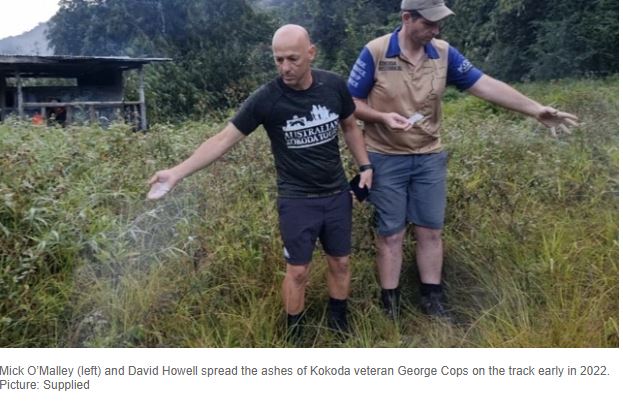
Mr O’Malley, who also runs the company Australian Kokoda Tours, said Mr Lynn had a point with some of the issues he had raised regarding maintenance.
“But withholding money from a struggling organisation that needs it is just wrong,’’ he said, referring to the underfunded KTA. “Is it going to help or make things worse?’’
Asked if the move by the KTTDA to collect the permit fees was part of a battle for control of the track he said, “Yes, to a degree. I don’t see any other explanation for it.’’
Political issues
Mr Lynn’s operating licence was revoked after he refused to pay the permits, although he has since won a court injunction after arguing the minister did not have the power to cancel it. He had agreed to pay retrospectively for the permits, and paid in full on April 17, but the issue is under scrutiny after Adelaide man Paul Miller, 48, died from a heart attack two days into one of the treks, on April 16.
The issue of Mr Lynn’s licence cancellations is yet to be adjudicated in the National Court of PNG.
He has been told he can resolve the matter by paying a fine and signing a declaration that he will not involve himself in local politics, but has refused to do so.
Mr Lynn told The Weekend Australian he had never involved himself in PNG politics.
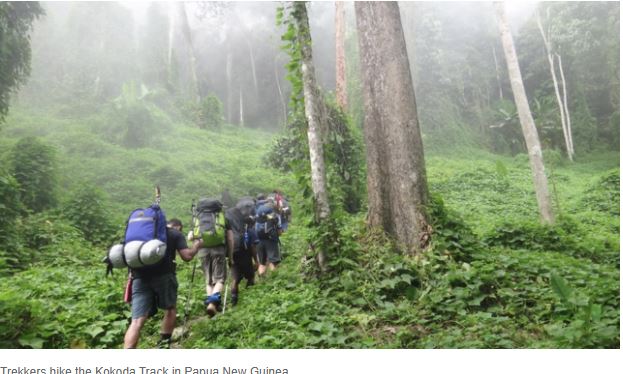
He said he had campaigned for years for authority over the track to be moved from the PNG environment minister’s remit to that the tourism minister, arguing it would lead to better understanding and management of the track, and stop falling trekker numbers, which had peaked at around 5500 in 2009, but had dropped ever since. He said he “had to take a stand on this one’’ and confirmed he had been “working closely with Kila and Andy Abel … we’ve been working together for five years”.
“Kokoda has been hijacked and controlled by the Australian government with the help of DFAT,’’ he said.
He said he had helped set up and fund the Kokoda Track Authority 20 years ago, but that Australia took over the track in 2009 and “it’s been downhill ever since’’.
“PNG has to reclaim ownership of the trail from the Australian government. It’s going to be hugely embarrassing to the Australian government.’’
Mr Lynn said he brought matters to a head in April because he was concerned about the state of the track, and could not get a response from the KTA about what actions it was taking.
He said the KTA failed to respond to his claims but “rushed up with a police contingent’’ once it realised he intended to trek without a permit.
Mr Sibolo said the intention had been for Mr Lynn to pay his trek fees to his organisation, but “unfortunately’’ they hadn’t opened a bank account in time.
Mr Lynn did not confirm this, saying only that it was a “bit vexed at the moment’’. Mr Wargirai would not comment on Mr Lynn’s case but defended the KTA, saying he was working to improve transparency and increase benefits to the local people.

The web page that greets visitors when attempting to access the Kokoda Track Authority.
He said legislation was being worked on, authorising a “fully fledged board’’ for the KTA.
“Also it will give the authority a wider opportunity to widen the benefits to the people on the track,’’ he said. “At the moment the KTA has limited jurisdiction to increase the benefits to the people on the track.’’
He said he had engaged an accounting firm to work on financial reports dating back to 2016, and they would be tabled in the parliament.
He described the rebel group KTTDA as “the one that is part of Charlie’’ and he urged all stakeholders along the track to work together.
“He (Mr Lynn) has done so much, I must admit that, since he first started. He has been a major player but we have to work together with the government. I would like to encourage everyone to work with the track authority,’’ he said.
Five-star experience?
Wayne Wetherall, founder of one of the largest tour companies, Kokoda Spirit, and member of the KTOA, said all Australian trekking companies operated as guests of PNG.
“We all want the same thing – to keep the spirit of the Diggers alive and maximise the benefit to the landowners, villagers and porters along the way,’’ he said.
“But we all need to work together to improve communication and transparency and make sure the track is protected for future generations.’’
Mr Wetherall said the tour operators kept the track functioning, and without trekkers there was no income for the landholders who owned the land along the track, the villagers, or the porters who worked for the trekking companies.
He said the track hadn’t changed since 2004 when he started trekking.
“But do we want to turn the track into a five-star experience? I don’t think so,’’ he said.
“The track is almost the same as it was 81 years ago when our boys (soldiers) walked it.
“Only 50,000 Australians have walked it since. It is difficult, it is authentic, it is one of the most raw experiences you can get in the world.
“PNG has a rare gem here, we have to keep that rawness and make sure that the benefits of the tours provide education, good accommodation and a safe environment for the villages.
“It is a long-term project and we cannot do it with infighting, personality conflicts, corruption and incompetence.’’
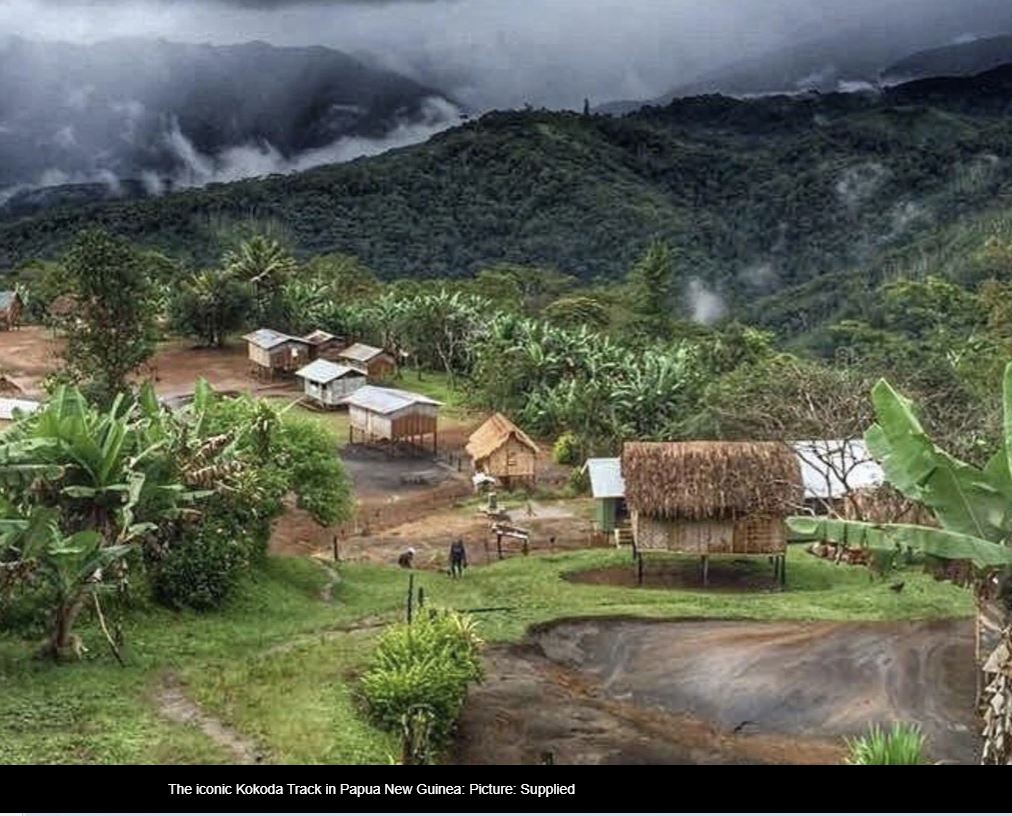
The iconic Kokoda Track in Papua New Guinea: Picture: Supplied
As the KTA scrambles to respond to Mr Lynn’s refusal to pay fees, it quickly ratified four board members, and said it would soon swear in five more, to give it a quorum. It had not previously had a functioning board of management.
‘He’s been misadvised’
Protests that broke out this week relate to the fact a Kovelo village representative was not among the four new board members – something the KTA says occurred because Kovelo failed for three years to nominate a representative.
While the protests have been uncomfortable for trekkers, they have been peaceful, and there was no suggestion of any implied violence, as there was in April, when minutes of a Kokoda Initiative Committee meeting claim striking porters were armed with bush knives while protesting.
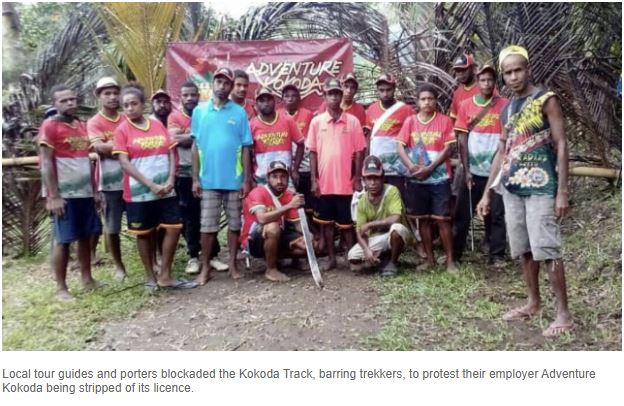
The Kokoda Track is open to trekkers between March and November, and is struggling to recover after almost three years of being closed due to Covid.
According to the KTOA, it has about 70 per cent of trekkers under its umbrella, while Mr Lynn’s company has about 15 per cent and small operators the remaining 15 per cent.
Mr O’Malley said he and a KTA representative had done a reconnaissance walk across the track in April 2022 after Covid to see how the track had fared.
They found bridges washed away, huts in disrepair, and villages abandoned, with locals forced to leave for Port Moresby or to go gold mining to find an income with no trekkers.
“The track was a shambles and the majority of the locals had left,’’ he said. “We went through villages that were boarded up, like ghost towns.’’
Asked the way forward, he said “through consultation and inclusion of all the stakeholders’’, including landowners and villagers.
“It would be better if we all worked together. The KTA is the government organisation put in place by the PNG government to manage the track. They have a board and that is the organisation that we need to abide by.’’
Mr O’Malley repeated an offer he said he had made twice for Mr Lynn to join the KTOA.
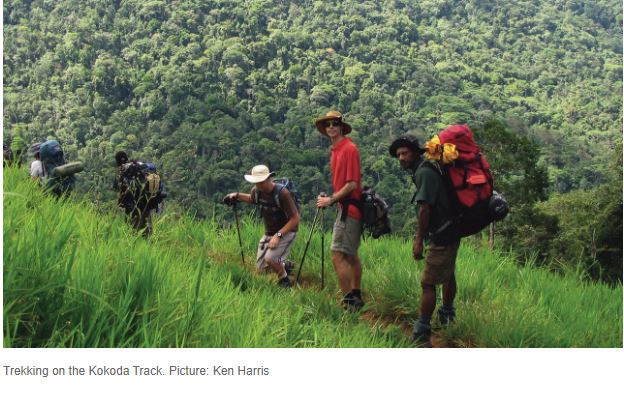
A pioneering trek operator who has walked Kokoda for 32 years, Mr Lynn, a former NSW politician, has famously clashed with government officials and rival operators for years, and refused Mr O’Malley’s offer to join the umbrella group.
Jack Deia, a PNG local, chairman of the KTA, and who works with KTOA member company No Roads, said Mr Lynn had done an enormous amount of good work over the years.
“Charlie loves the track and loves the community. He’s a good bloke. But he’s been misadvised by this association that’s been formed,’’ he said.
“It is not in the best interests of the landowners.’’
The PNG government is in the process of formally transitioning the Kokoda Track Authority to a new management authority.
A DFAT spokesman said Australia supported the Kokoda Track through its $5m annual Kokoda Initiative Partnership, which provided support to communities along the track. “The management of the Kokoda Track is a matter for the Papua New Guinea government and its Kokoda Track Authority,’’ the spokesman said.
